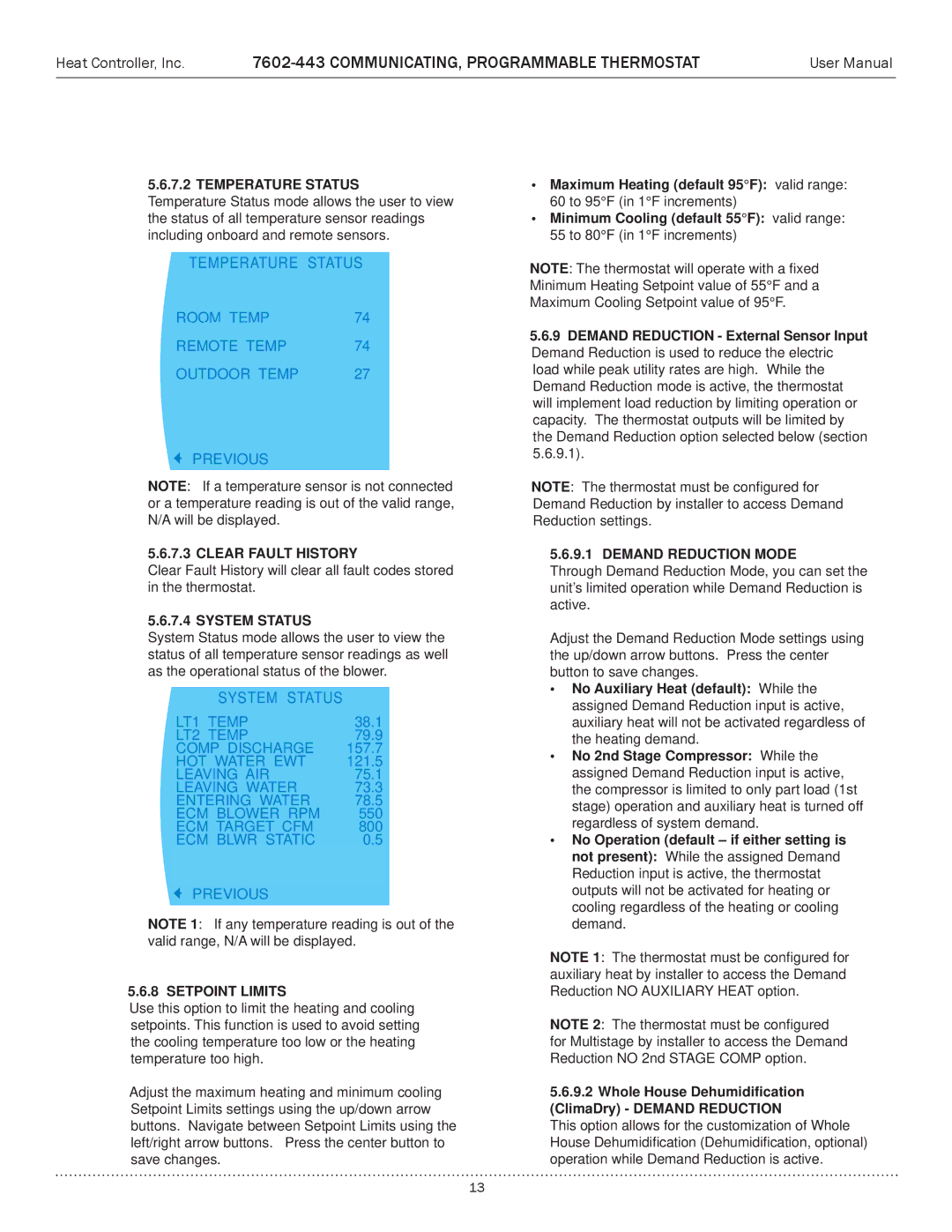
Heat Controller, Inc. |
| User Manual |
|
|
|
5.6.7.2 TEMPERATURE STATUS
Temperature Status mode allows the user to view the status of all temperature sensor readings including onboard and remote sensors.
TEMPERATURE STATUS
ROOM TEMP | 74 |
NO DEMAND REDUCTION |
|
REMOTE TEMP | 74 |
OUTDOOR TEMP | 27 |
PREVIOUS
NOTE: If a temperature sensor is not connected or a temperature reading is out of the valid range, N/A will be displayed.
5.6.7.3 CLEAR FAULT HISTORY
Clear Fault History will clear all fault codes stored in the thermostat.
5.6.7.4 SYSTEM STATUS
System Status mode allows the user to view the status of all temperature sensor readings as well as the operational status of the blower.
SYSTEM STATUS
LT1 TEMP | 38.1 |
LT2 TEMP | 79.9 |
COMP DISCHARGE | 157.7 |
HOT WATER EWT | 121.5 |
LEAVING AIR | 75.1 |
LEAVING WATER | 73.3 |
ENTERING WATER | 78.5 |
ECM BLOWER RPM | 550 |
ECM TARGET CFM | 800 |
ECM BLWR STATIC | 0.5 |
PUMP WATTS | 140 |
FLOW RATE GPM | 7.4 |
PUMP SPEED | 60% |
PREVIOUS
NOTE 1: If any temperature reading is out of the valid range, N/A will be displayed.
5.6.8 SETPOINT LIMITS
Use this option to limit the heating and cooling setpoints. This function is used to avoid setting the cooling temperature too low or the heating temperature too high.
Adjust the maximum heating and minimum cooling Setpoint Limits settings using the up/down arrow buttons. Navigate between Setpoint Limits using the left/right arrow buttons. Press the center button to save changes.
•Maximum Heating (default 95°F): valid range: 60 to 95°F (in 1°F increments)
•Minimum Cooling (default 55°F): valid range: 55 to 80°F (in 1°F increments)
NOTE: The thermostat will operate with a fixed Minimum Heating Setpoint value of 55°F and a Maximum Cooling Setpoint value of 95°F.
5.6.9DEMAND REDUCTION - External Sensor Input Demand Reduction is used to reduce the electric load while peak utility rates are high. While the Demand Reduction mode is active, the thermostat will implement load reduction by limiting operation or capacity. The thermostat outputs will be limited by the Demand Reduction option selected below (section 5.6.9.1).
NOTE: The thermostat must be configured for Demand Reduction by installer to access Demand Reduction settings.
5.6.9.1 DEMAND REDUCTION MODE
Through Demand Reduction Mode, you can set the unit’s limited operation while Demand Reduction is active.
Adjust the Demand Reduction Mode settings using the up/down arrow buttons. Press the center button to save changes.
•No Auxiliary Heat (default): While the assigned Demand Reduction input is active, auxiliary heat will not be activated regardless of the heating demand.
•No 2nd Stage Compressor: While the assigned Demand Reduction input is active, the compressor is limited to only part load (1st stage) operation and auxiliary heat is turned off regardless of system demand.
•No Operation (default – if either setting is not present): While the assigned Demand Reduction input is active, the thermostat outputs will not be activated for heating or cooling regardless of the heating or cooling demand.
NOTE 1: The thermostat must be configured for auxiliary heat by installer to access the Demand Reduction NO AUXILIARY HEAT option.
NOTE 2: The thermostat must be configured for Multistage by installer to access the Demand Reduction NO 2nd STAGE COMP option.
5.6.9.2Whole House Dehumidification (ClimaDry) - DEMAND REDUCTION
This option allows for the customization of Whole House Dehumidification (Dehumidification, optional) operation while Demand Reduction is active.
13
